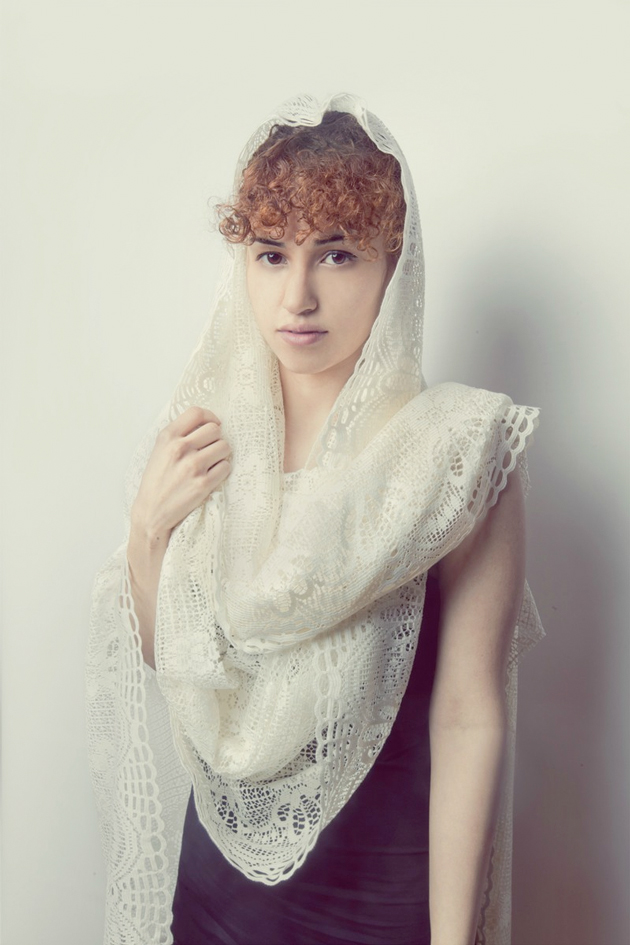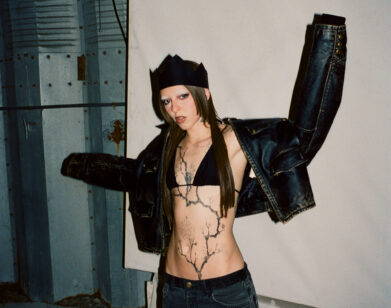Systems Analysis with Empress Of

ABOVE: LORELY RODRIGUEZ, AKA EMPRESS OF.
For most people, the introduction to Empress Of and her music came in the form of 15 mysterious YouTube clips that contained only about a minute of electronic pop music each, alongside a single color swatch. The woman behind the clips, Lorely Rodriguez, called the project Colorminutes. Her mysterious introduction was a conscious choice. By providing absolutely no other data besides a name, a number, and a color, Rodriguez’s new listeners would have to hear the music with no expectations. The Colorminutes project eventually saw release in the form of delicately packaged, colored cassette tapes from the Japanese label Big Love.
In the past few months, Empress Of has transformed into a very different project than the early bedroom-produced Colorminutes. She put together a live band, toured nationally with Jamie Lidell, and released an EP with Terrible Records, making her labelmates with the likes of Solange and Blood Orange. Her new EP, Systems, is out now.
MATT PUTRINO: Your first physical release was the Colorminutes tape. If you had no budget or production concerns, what would be your dream record packaging?
LORELY RODRIGUEZ: Going on tour recently, and selling merch to fans, I feel like people don’t really get tapes. I was selling tapes and vinyl, and a lot of the people who wanted to buy music were like, “Don’t you have a CD?” To me, that’s the limiting thing. No one really listens to that format, but I really love how tapes sound. I really like releasing tapes, especially for the Colorminutes project, it was so intimate. When I popped it into a tape player, it sounded the way I wanted my music to sound. If it were a more accessible format, I would definitely release more tapes. That’s my dream packaging. It doesn’t really require much of a budget, just more people being into it.
PUTRINO: Your new EP, Systems, is half in English and half in Spanish. Did you grow up speaking both languages?
RODRIGUEZ: Yeah, my first language was Spanish. I went to school and they put you in classes where all the kids speak Spanish, especially in LA, which is where I grew up. They put you in these ESL classes, and the teacher speaks Spanish, but teaches you English, and also the curriculum in Spanish.
PUTRINO: How do you think being bilingual has affected your songwriting?
RODRIGUEZ: I speak English mostly now. I just speak Spanish to my parents or when I want to use it. I don’t really have too many Spanish-speaking friends, which is kind of a shame, just because the kids I hang out with in Brooklyn, there aren’t really any Hispanic people. But I really like writing in Spanish. I kind of feel obligated to do it a little bit because my mom is a really important part of my life, and since I started writing in Spanish, she’s connected more with my project. It’s weird, she’s an immigrant and she doesn’t get the music scene, or blogs or things like that. But because I’ve written music in Spanish, she goes out of her way to listen to it and learn the lyrics and sing them back to me, annoyingly.
PUTRINO: That’s amazing.
RODRIGUEZ: Yeah, it’s cool. Then she comes up to me and tells me about all the bands I’m playing with, like, “Lorely, I heard this band Chairlift, and they are so good!” I really like writing in Spanish. I listened to El Guincho for the first time a few years ago, and I couldn’t stop listening to it when I heard it. I never heard anyone making music like that. Experimental, electronic, weirdo pop music in Spanish. A lot of the bands from Spanish-speaking countries try to sound like American or UK bands and sing in English. It was cool to hear him, and inspired me to make weirder pop music in Spanish. [El Guincho’s remix of Empress Of’s “Tristeza” is below.]
PUTRINO: This Jamie Lidell tour you just finished was your longest tour yet, right? How did it go?
RODRIGUEZ: Well, I had never been on tour before. This was the first and longest tour, it was six weeks long. I don’t think I ever want to tour for six weeks. It was my first tour, so it still had really DIY elements, even though I was working with a booking agency. I was doing a lot of the driving, 6,000 miles or something. My butt hurts really bad from sitting in a car for that long. I’d drive for seven hours, load my gear in, talk to the sound guy, talk to the promoter, and do all of that again every day. It was cool because I learned a lot about touring. When I have the things that the next step of a musician gets—a driver, a sound guy, a tour manager—I’ll be really appreciative. That part of it was a really big learning experience. The tour itself was really amazing, because I really like Jamie Lidell. I used to listen to his music many, many years ago. It was kind of weird being in the green room and hearing these songs I used to sing to myself in my college bedroom. That was a weird, twisted, cool part about the tour. To think, never being on tour before, only playing to my New York crowd before, to then play for 300 to 700 people a night, every night—it was the best school I could ever be in. No matter what vibe you’re in, whether you’re tired or cranky, you still have to perform. You still have to give them the same show you gave yesterday.
PUTRINO: This UK tour is much shorter.
RODRIGUEZ: I’m going to be there for a week. I’ll be doing some hanging out, meeting some people.
PUTRINO: I saw one of the shows is booked at an old Jamaican social club.
RODRIGUEZ: Yeah, I heard that yesterday, I’m totally down, that sounds awesome. I think the club is called Total Refreshment. I play tons of warehouses and DIY spaces in New York, and I’ve been asked to play delis. I’m down to play anywhere.
PUTRINO: Now that you’re on this constant touring schedule, when you go to write new music, do you think about it in terms of the full band or is it still mostly a solo mission?
RODRIGUEZ: The last songs I wrote, I wrote because I didn’t have enough songs to go on tour with, but I never recorded them. I just told my band what to play, and they sound great. But they’re also the audience’s favorite songs that I play. I get emails like, “What’s that song that you played… blah blah blah.” I want to write songs that are easier to play live; I want to write songs with live instruments in mind. When I used to write music like Colorminutes, it was more instinctive. I wasn’t thinking about actual humans playing it. When I write in the future, like I did with those songs I just wrote, I’ll take into account that people are going to play them. I want to make it fun for them to play, but also interesting. That’s something I’m going to keep in mind.
PUTRINO: So the band name came from a Tarot card reading; are you heavy into astrology and stuff like that?
RODRIGUEZ: No, not at all. That’s why that one particular instance stuck with me. I don’t really understand it, so I took my own meaning from the cards my friend pulled out during the meeting. If I knew more about it, it wouldn’t stick with me. I fantasize my own meaning of the Tarot cards.
PUTRINO: You’ve also mentioned you’re influenced by ’60s Colombian music, and some music from Honduras. Who’s been a big influence?
RODRIGUEZ: [There’s one] really famous Colombian singer, Totó la Momposina. She’s the queen.
PUTRINO: Do you do a lot of digging at record stores?
RODRIGUEZ: I do a lot of digging on the Internet, through a lot of archives, and I try to find weird Spanish rock bands from the ’60s that try to sound like the Beatles. Which there were a lot of. They have really terrible lyrics about, like, alligators and stuff. It’ll be like, “The alligator’s gonna come… and bite you!” I find a lot of weird music on the Internet, I don’t really go to record shops a lot.
PUTRINO: You’ve always had a really interesting online presence. Things like your Craigslist-themed website, with those amazing images, and the Colorminutes videos. Do you have any other digital projects you’d like to do before releasing a full-length?
RODRIGUEZ: I’m working on something right now. I don’t know how I’m going to execute this, but I’m going to do another Colorminutes-type project, where I’m going to write one-minute songs every day for a month. The end result will be that some of the songs will be on the full-length. I’m going to create a blog and upload them every day, but I’m going to change the URL every week so nobody finds it. It’s going to be kind of like a diary, like a sound diary. I’m going to take photographs and tell the story of everything that happened that day, and the lyrics are going to reflect that. It’s going to be a journal, but I don’t think anyone will find it. My manager will know about it, and maybe three or four of my friends will know about it. I like the idea of having an online presence and no one knowing about it. Now that when I put music out people listen to it, which I’m really grateful for, I still like the idea of putting music out and wondering who’s going to find it—what weirdo, looking up tags like “Crocodiles,” “Shoes,” and “Glittery Hazy Pops.” If I wrote that tag, what weirdo is going to find that?
PUTRINO: That weirdo will get the whole album early.
RODRIGUEZ: Yeah, they get my whole record before it’s out. That’s the next online thing I’m going to do. I’m really into doing online projects that advertise the music in a really interesting way. That’s a really important part, and it [should] reflect how your music sounds.
PUTRINO: It’s so much more personal than a regular SoundCloud upload.
RODRIGUEZ: My website, for me, it’s really fun to be on. When I click through the images, I’ll be like, “Oh, I forget where I found that. I was looking up ‘weird disco sandwich,’ and I found that image.”
EMPRESS OF’S SYSTEMS IS NOW AVAILABLE. SHE WILL PLAY SILENT BARN IN BROOKLYN WITH TWIN SISTER THIS SATURDAY. AT THE END OF THIS MONTH, SHE’LL PLAY HER FIRST SHOWS IN THE UK. FOR MORE ON THE ARTIST, VISIT HER WEBSITE.






